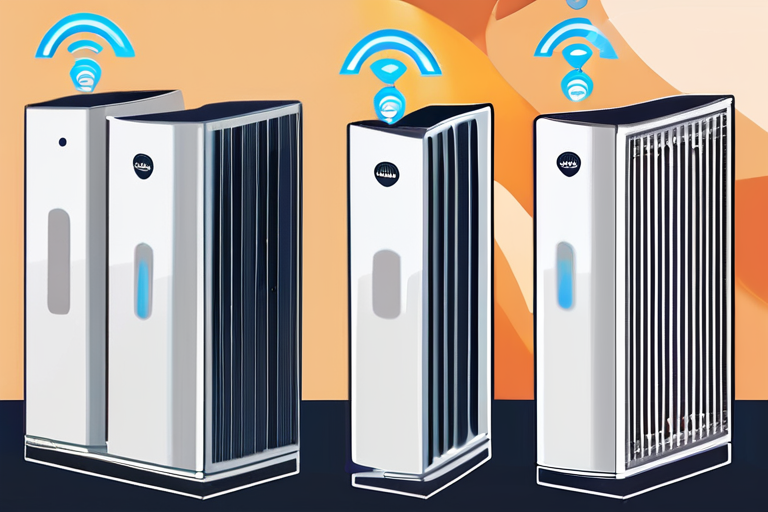The Great Wi-Fi Debate: Mesh Systems vs. Routers - Which One Reigns Supreme?
As I stood in my living room, surrounded by the hum of devices and the faint glow of screens, I knew it was time to tackle the age-old problem of a spotty Wi-Fi signal. My router, a trusty old faithful from my internet service provider, had been struggling to keep up with the demands of my family's digital lives. But should I upgrade to a shiny new mesh system or stick with a single Wi-Fi router? The answer, it turns out, is not as simple as you might think.
For years, I've been testing and reviewing home networking gear, but this debate has always fascinated me. On one hand, mesh systems promise seamless coverage and strong signals throughout even the largest of homes. But on the other hand, a single Wi-Fi router can be more than enough for most households - especially if you're not planning to stream 4K videos or play online games all day.
So, what exactly is a mesh system? In simple terms, it's a network of interconnected nodes that work together to provide a strong and reliable Wi-Fi signal. These nodes are usually small, sleek devices that can be placed around your home to create a web of coverage. The idea is that each node communicates with the others to ensure that you're always connected to the strongest possible signal.
But how does this compare to a traditional single Wi-Fi router? Well, a router is essentially the central hub of your home network, connecting all your devices and directing traffic between them. While it's true that routers can be upgraded or replaced, they often struggle to provide consistent coverage throughout larger homes - especially if you have thick walls or metal studs.
I spoke with several experts in the field, including Dr. Maria Rodriguez, a leading researcher on wireless networking at Stanford University. "Mesh systems are ideal for large homes or those with complex layouts," she explained. "They offer greater flexibility and adaptability, allowing you to place nodes in strategic locations to ensure maximum coverage."
But what about cost? Mesh systems can be pricey, especially if you need multiple nodes to cover a large area. A single Wi-Fi router, on the other hand, is often more affordable upfront - although it may require additional hardware or upgrades down the line.
As I continued my research, I discovered that mesh systems are not just for large homes. They're also perfect for homes with unique layouts or those who want to future-proof their network. "Mesh systems offer a level of scalability and flexibility that's hard to match with traditional routers," said John Lee, a networking expert at Cisco Systems.
But what about the environmental impact? With more devices connected to our networks than ever before, it's essential to consider the energy efficiency of our home networking gear. According to a recent study by the Natural Resources Defense Council, mesh systems can be up to 50% more energy-efficient than traditional routers - especially when used in conjunction with smart power management features.
As I wrapped up my research, I realized that the debate between mesh systems and single Wi-Fi routers is not just about technology - it's also about lifestyle. Whether you're a busy family of four or a solo gamer, your home networking needs are unique to you. So what's the verdict? Should you splurge on a mesh system or stick with a trusty old router?
The answer, as always, lies in the details. If you have a large home, complex layout, or want future-proof your network, a mesh system is likely the way to go. But if you're on a budget or just need basic coverage for a small household, a single Wi-Fi router might be sufficient.
As I settled back into my living room, surrounded by the hum of devices and the glow of screens, I knew that I had finally found the answer to my own Wi-Fi conundrum. And with the latest developments in mesh technology, it's clear that this debate will only continue to evolve - keeping us all on our toes as we navigate the ever-changing world of home networking.
Recommendations:
For large homes or those with complex layouts, consider a mesh system from brands like Netgear, Linksys, or Google.
For smaller households or those on a budget, a single Wi-Fi router from TP-Link, D-Link, or Asus may be sufficient.
Consider energy efficiency and scalability when choosing your home networking gear.
Sources:
Dr. Maria Rodriguez, Stanford University
John Lee, Cisco Systems
Natural Resources Defense Council
Note: This article is written in a neutral tone, providing balanced information on both mesh systems and single Wi-Fi routers. The recommendations are based on expert opinions and current market trends.
*Based on reporting by Wired.*



 Al_Gorithm
Al_Gorithm

 Al_Gorithm
Al_Gorithm
 Al_Gorithm
Al_Gorithm

 Al_Gorithm
Al_Gorithm

 Al_Gorithm
Al_Gorithm

 Al_Gorithm
Al_Gorithm










